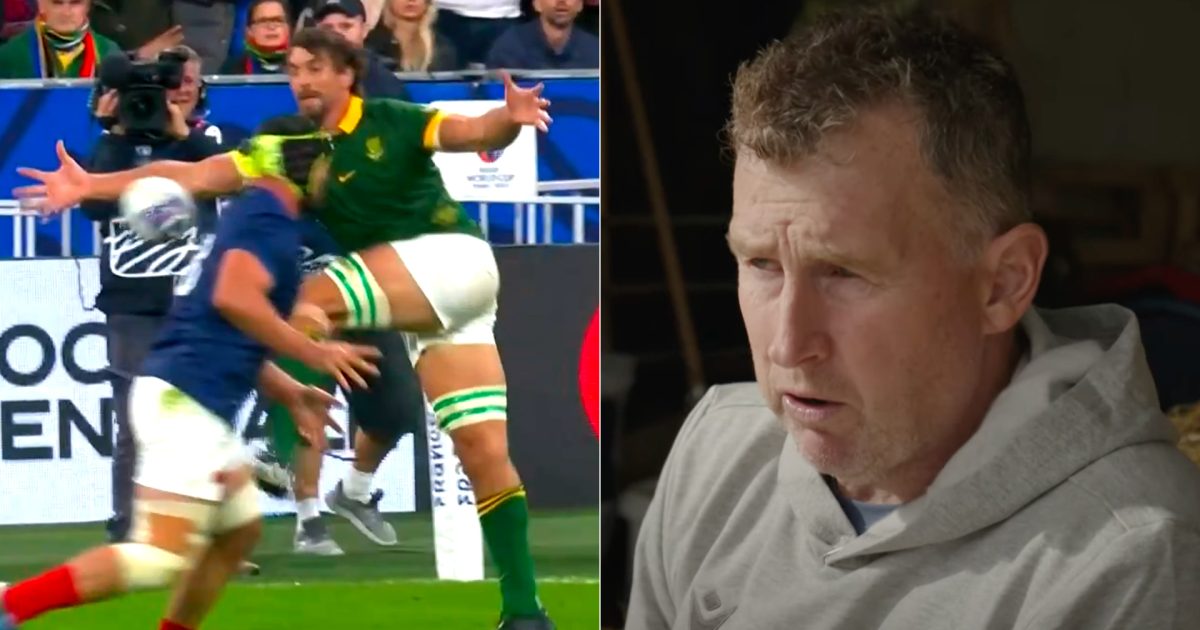The Nigel Owens verdict on the big calls that upset a nation

After what was arguably one of the best weekends of Rugby World Cup action fans have seen, there were a number of incidents that have since been dissected.
Referee Nigel Owens has addressed some of the biggest calls, perhaps leaving a few more questions than answers at times, but hopefully clearing up a few of the big issues.
France in particular were unhappy following their epic contest with South Africa, and Owens has looked directly at two of the main talking points.
The Eben Etzebeth intercept attempt
In the 7th minute of the match, with France already 7-0 up and dominating, they surged forward and looked to have an overlap out wide. Etzebeth leaped to intercept and knocked the ball down with one hand. The crowd felt it was a knock on, but the officials said it went backwards or at least, laterally, out his hand.
Owen’s explains why the game played on.
“He is very, very lucky. He goes with one hand out. There is no way he’s going to catch the ball, so what he tries to do, he tries to knock the ball backwards, which is legal! As long as you knock the ball backwards. If he had made contact with that ball and that ball had gone forward, then it would be a deliberate knock on and a pretty certain yellow card as well.
“When you look at the footage, there’s a lot of debate about this. Some of you saying, ‘well I think it’s gone forward’, some of you saying ‘no I think it’s gone backwards’. It really is a very very difficult one. It’s impossible to see 100%, to put your house on it, has it gone forward or has it gone back.
“So the referee looks at this, and I have to say, I tend to agree with the referee here because it’s very difficult to say that’s its gone forward or gone back, so the referees view (and the TMOs view) is, the ball went backwards – or certainly didn’t go clearly forward – and therefore we have a play on.
“But remember, he’s very, very lucky. If that goes forward, it’s a pretty certain penalty and yellow card.”
The Kwagga Smith penalty win
Owens gave his explanation for why Smith was not penalised when he won a crucial breakdown turnover in the 68th minute.
“Some of you have been debating. ‘What about the penalties, hands on ground, legal or not?’ Okay.. Nothing in law says that you can’t put your hands on the ground. So we can’t say that any player that puts his hand on the ground is committing an offence, because it doesn’t say that in the law. So the way that the referees will deal with this, is the law of the contact tackle area. So if you come in to jackal the ball, what the jackler must do? He must release the ball carrier before he regathers on the ball, or if he’s not in contact with the ball carrier, when he comes in, he must maintain his own body weight.
“So what he can’t do, is put his hands away or beyond the ball to support his body weight and then come on to the ball to gather. Now if he comes in and tries to go for the ball but in doing so because of the speed, his hands touches the ground around the ball, but that is not keeping his weight up – which means he’s supporting his own bodyweight – then we won’t necessarily penalise the hand touching the ground. We’d only penalise it if the hands are too far or he’s using the ground to support his bodyweight.
“So that’s what the referee decides. The referee needs to decide, was that hand supporting the bodyweight before he goes onto the ball and if so, it will be a penalty. If he feels well, he just touched the ground around the ball, it’s not supporting his bodyweight, then we’d have a play on.”
Pollard landed the 52m penalty to give South Africa a 29-25 lead.
You can watch the full video below (territory dependant).
Etzebeth and Smith will both be in action again on Saturday, when South Africa take on England in the semi-final of this year’s Rugby World Cup.



































